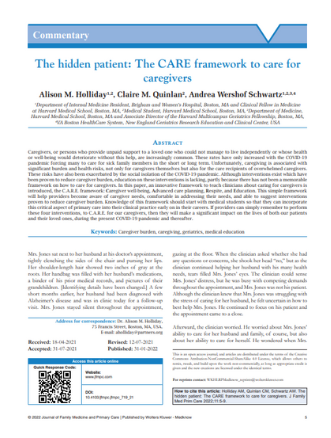The hidden patient: The CARE framework to care for caregivers
Caregiver burden is a common and significant problem with serious consequences not only for caregivers but also for the care provided to patients. These risks have also been exacerbated by the social isolation of the COVID‑19 pandemic. This research outlines how to apply a C.A.R.E framework to reduce caregiver stress.
Author: Alison M. Holliday, Claire M. Quinlan, Andrea Wershof Schwartz
Publication Date: January 11, 2022
Description: Caregivers, or persons who provide unpaid support to a loved one who could not manage to live independently or whose health or well‑being would deteriorate without this help, are increasingly common. These rates have only increased with the COVID‑19 pandemic forcing many to care for sick family members in the short or long term. Unfortunately, caregiving is associated with significant burden and health risks, not only for caregivers themselves but also for the care recipients of overwhelmed caregivers. These risks have also been exacerbated by the social isolation of the COVID‑19 pandemic. Although interventions exist which have been proven to reduce caregiver burden, education on these interventions is lacking, partly because there has not been a memorable framework on how to care for caregivers. In this paper, an innovative framework to teach clinicians about caring for caregivers is introduced, the C.A.R.E. framework: Caregiver well‑being, Advanced care planning, Respite, and Education. This simple framework will help providers become aware of caregiver needs, comfortable in addressing their needs, and able to suggest interventions proven to reduce caregiver burden. Knowledge of this framework should start with medical students so that they can incorporate this critical aspect of primary care into their clinical practice early on in their careers. If providers can simply remember to perform these four interventions, to C.A.R.E. for our caregivers, then they will make a significant impact on the lives of both our patients and their loved ones, during the present COVID‑19 pandemic and thereafter.
Access: Free
Keywords: Caregiver burden, caregiving, geriatrics, medical education



